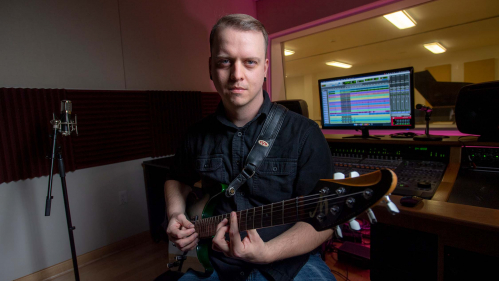Doctoral Student Studies Video Game Music in Career Inspired by Atari

As a self-taught guitarist, Vaders-Collins began to recreate the games’ music by ear and write his own arrangements. An unshakeable passion for video game music was born.
Aaron Vaders-Collins has been moving toward a certain career path since the age of 4, when he started playing video games on an Atari 2600, challenging his skills with early-’80s classics like Pitfall! and Adventure. As the technology evolved, the systems and games grew more complex, with richer visuals and sophisticated soundtracks.
Later, as a self-taught guitarist, Vaders-Collins began to recreate the games’ music by ear and write his own arrangements. An unshakeable passion for video game music was born.
“If you grew up playing video games and you also play an instrument, you don’t initially think, video game music should be where I go in life,” says Vaders-Collins. “But over time it just kind of inches in that direction.”
Vaders-Collins is a first-year doctoral student at Mason Gross School of the Arts pursing a degree in music composition and the emerging field of ludomusicology, the scholarly analysis of video game music. A mashup of technology and music theory, engineering, and production, the subject is a perfect blend of Vaders-Collins’s interests.
“I’m one of those odd people who is very creative and artistic but also technical and analytical,” says Vaders-Collins. “I’m a creator, and the more ideas I can I have to work with, to explore, the more exciting and inspiring it is.”
The path to a PhD has been a challenging, far-reaching personal exploration for Vaders-Collins—“a constant journey, a struggle—a grind,” as he describes it.
Vaders-Collins dropped out of a homeschool education at age 16 to work to support his family, but then earned a GED at age 18 to pursue a music degree at Liberty University in Virginia. He worked a full-time job in IT while going to school, and began tutoring fellow students in music theory.
Then, in the middle of his sophomore year, after a devastating breakup, he impulsively joined the U.S. Army.
“I was trying to figure what to do with my life,” explains Vaders-Collins, a field artillery specialist who was stationed at Fort Wainwright in Fairbanks, Alaska, before deploying to Iraq in 2008. “Everybody has a different reason for joining the Army, but for me, I wanted to grow. I was 20 years old at that point and I hadn’t done many significant things in my life.”
Vaders-Collins, who had taught private guitar lessons since the age of 15, always knew he wanted to be an educator, and says his Army experience was invaluable in preparing him to guide younger people.
“Professors are mentors, they’re not just content-delivery systems,” says Vaders-Collins. “What I really wanted out of [my Army experience] was to mature, to be put through difficult situations and to become strong, to be able to use that experience to make me wise. I just wanted to develop as a person and be able to take that with me throughout my life and career.”
Nearly four years after enlisting, Vaders-Collins, who had continued his studies at Liberty through the school’s online program, transferred from active duty to the Army National Guard and finished his undergraduate degree focused on music and computer information systems.
He then earned a master’s degree in music education from Liberty and an additional master’s degree in music technology from the University of Valley Forge in Pennsylvania, all while continuing to work in IT to make ends meet.
Vaders-Collins says having to work throughout his academic career helped him develop a dedication to expanding access to collegiate music programs for all students. This includes the creation of programs that can be completed over distance and on varying learning platforms and formats.
“Someone shouldn’t be inhibited from taking a certain career path or learning about a certain thing just because they don’t have the privilege to stop working or relocate to go to school full time,” says Vaders-Collins. “I have a big passion for figuring out how we can make these music programs friendly to people of different lifestyles.”
As it happens, Rutgers is in an ideal location for Vaders-Collins, a reasonable distance from his home in Philadelphia, where he lives with his wife and young daughter, and close to New York City, where future career opportunities may await.
Even better, his professors in the Music Department have “another vision for music education and music in academia than other schools seem to have,” says Vaders-Collins.
“Rutgers seems to want people with my interests and my background—more interdisciplinary people,” says Vaders-Collins, who plays guitar in the U.S. Army Band as well for professional musical theater productions. “I like to write rock music and funk and jazz, and I like to write for games, these fun little catchy tunes that happen in the background while you’re playing. This is the place that said, ‘Heck yeah, come on out, let’s do it.’”
Vaders-Collins was also drawn to Rutgers because of professors like Steven Kemper, a composer, music technologist, and instrument designer who is serving as the interim director of the Music Department.
Kemper is co-founder of Expressive Machines Musical Instruments, a collective dedicated to creating and composing music for robotic instruments. Contemporary ensembles including the Boston Modern Orchestra Project and American Modern Ensemble, among many others, have performed Kemper’s compositions, making him an ideal mentor for Vaders-Collins.
“He’s a very smart and experienced and well-researched person,” Vaders-Collins says of Kemper. “So whatever type of composition I want to do, I’m sure he can help refine my skill set, and because of his highly technical background, he can understand the concepts of video game music very quickly.”
Kemper says Vaders-Collins is a welcome addition to Mason Gross as a composer and researcher in the complex, evolving world of video game music.
“It’s been exciting to have Aaron as a student and to help him continue to develop his compositional voice,” says Kemper. “I’m extremely impressed by his ability to quickly create music in a variety of different styles as the needs of the game dictate.”
Kemper says the world of video game music is fascinating because of its historical traditions based on the limitations of early game systems and the musical approaches taken by pioneers in the field. Now, he points out that iconic scores from the most famous video games are regularly performed by symphony orchestras.
Vaders-Collins may one day have his own work performed by an orchestra, but his ultimate goal is to teach music theory and video game scoring at the collegiate level.
“I would have a blast being able to prepare composers who are also gamer nerds like me for a career that marries their two passions together,” says Vaders-Collins. “That’s what I’m doing.”


